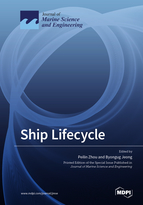Ship Lifecycle
A special issue of Journal of Marine Science and Engineering (ISSN 2077-1312). This special issue belongs to the section "Ocean Engineering".
Deadline for manuscript submissions: closed (15 December 2019) | Viewed by 34185
Special Issue Editors
Interests: marine propulsion system design and efficiency improvement; engine combustion and simulation; combined cycle; marine engines’ NOx, SOx and CO2 emission control; ship ballast water treatment; fuel cells marine application; biodiesel application; life cycle analysis on water-borne transport and shipyard green technology
Special Issues, Collections and Topics in MDPI journals
Interests: maritime safety; risk assessment; fire/explosion; lifecycle assessment
Special Issues, Collections and Topics in MDPI journals
Special Issue Information
Dear Colleagues,
With growing concerns regarding marine pollution, the International Maritime Organization (IMO) has recently adopted a new resolution, MEPC.304 (72), presenting a strategy for curbing greenhouse gas emissions (GHGs) from ships. Along with this, a series of stringent regulations to limit nitrogen oxides (NOx) and sulphur oxides (SOx) from shipping activities have been produced at both international and local levels. Such ambitious regulatory works have led us to believe that cleaner production and shipping is one of the most urgent issues in the marine industry.
In order to contribute to global efforts by addressing the marine pollution from various emission types, this Special Issue of the Journal of Marine Science and Engineering aims to provide proper insight for naval architects, marine engineers, shipyards, and ship-owners as they strive to find optimal ways to survive in competitive markets by improving cycle time and the capacity to reduce design, production, and operation costs while pursuing zero emissions.
In this context, this Special Issue is devoted to inviting the latest research and technical developments on ship production, operation, maintenance and even commission on various aspects, such as economy, environment and safety. The goal of this Special Issue is to bring together researchers from various maritime application fields into a common forum, to share cutting-edge research on ship lifecycles. It is strongly believed that such a joint effort will contribute to enhancing the sustainability of marine and maritime activities.
Prof. Peilin Zhou
Dr. Byongug Jeong
Guest Editors
Manuscript Submission Information
Manuscripts should be submitted online at www.mdpi.com by registering and logging in to this website. Once you are registered, click here to go to the submission form. Manuscripts can be submitted until the deadline. All submissions that pass pre-check are peer-reviewed. Accepted papers will be published continuously in the journal (as soon as accepted) and will be listed together on the special issue website. Research articles, review articles as well as short communications are invited. For planned papers, a title and short abstract (about 100 words) can be sent to the Editorial Office for announcement on this website.
Submitted manuscripts should not have been published previously, nor be under consideration for publication elsewhere (except conference proceedings papers). All manuscripts are thoroughly refereed through a single-blind peer-review process. A guide for authors and other relevant information for submission of manuscripts is available on the Instructions for Authors page. Journal of Marine Science and Engineering is an international peer-reviewed open access monthly journal published by MDPI.
Please visit the Instructions for Authors page before submitting a manuscript. The Article Processing Charge (APC) for publication in this open access journal is 2600 CHF (Swiss Francs). Submitted papers should be well formatted and use good English. Authors may use MDPI's English editing service prior to publication or during author revisions.
Keywords
- Life cycle assessment (LCA)
- Maritime environment
- Sustainable production and shipping
- Multi-criteria decision making (MCDA)
- CO2 emission
- NOx emission
- SOx emission







